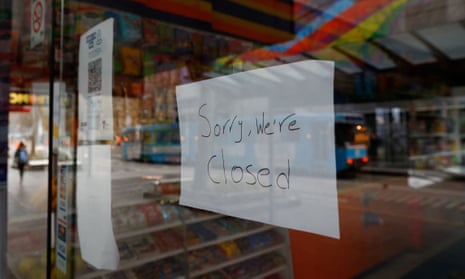Small businesses have been forced to close during the crucial summer holiday period because of the failure of state and federal governments to bring in free Covid rapid antigen tests, the sector’s peak body says.
Alexi Boyd, the chief executive of the Council of Small Businesses of Australia (Cosboa), said she welcomed an announcement by the New South Wales premier, Dominic Perrottet, that the state had ordered 20m rapid antigen tests, which he expected to be available by the end of January.
But Boyd said many hospitality and tourism businesses had already been forced to slam shut their doors due to a lack of staff amid a dramatic increase in case numbers, led by NSW, caused by the highly contagious Omicron variant.
In October, Cosboa, unions and transport industry bodies called on governments to make rapid antigen tests, which deliver results within minutes, free for small businesses.
“We could see with the reopening of the economy that we needed to see workers not re-entering the workforce unnecessarily and endangering people,” she said.
She said the long waiting times seen at stations delivering polymerase chain reaction tests, which are more reliable than rapid antigen tests but take longer to return a result, were foreseeable at the time.
“These lines at PCR testing facilities, of course they were going to happen,” she said.
Speaking in Wagga Wagga on Tuesday, Perrottet said the NSW government had “put an order in for 20m rapid antigen tests”.
“My expectation is they will be available by the end of January,” he said.
“As we move into 2022, as we are living alongside the virus, taking personal responsibility, rapid antigen tests will be key.
“They are not to be used in circumstances where you are going out to the shops. These tests will be used for people going to high-risk settings. Going to hospitals, visiting elderly relatives, going clubbing.”
Boyd said Cosboa was “really pleased to see that the NSW government was taking action and showing some leadership in this regard and recognising that RATs are an important factor”.
“If all governments around Australia, including the federal government, had taken some action we might have found ourselves in a different space.”
The ACTU has also criticised Scott Morrison for failing to provide rapid antigen testing.
Last week, the acting secretary, Liam O’Brien, said Morrison’s inaction led to “testing sites jammed and a looming crisis on our hands”.
“Scott Morrison’s callous indifference to Australians who cannot afford the sky-high costs of rapid antigen tests proves yet again that working people cannot trust this prime minister to be there when they need him,” he said.
Boyd said small businesses had “really risen to the challenge of keeping their workers and customers – even the not so nice ones – safe” and were now suffering from worker shortages at what for many was their high season.
“For some of them, this summer period, these weeks, can be the income that they live on for months,” she said.
“There’s a lot of businesses that chose to close over the Christmas period because of the low foot traffic, but more because of the risk of transmission.”
Quick GuideHow to get the latest news from Guardian Australia
Show

Email: sign up for our daily morning and afternoon email newsletters
App: download our free app and never miss the biggest stories
Social: follow us on YouTube, TikTok, Instagram, Facebook or Twitter
Podcast: listen to our daily episodes on Apple Podcasts, Spotify or search "Full Story" in your favourite app
She said some business owners who remained open were burning out due to long hours caused by a shortage of workers.
The Morrison government’s decision to slam Australia’s borders shut during the pandemic cut off the supply of overseas labour relied upon by some Australian businesses.
“Worker shortages – that’s across the board from accounting and IT to hairdressing and retail,” Boyd said.
“You’ve got worker shortages caused by border closures, you’ve got the ongoing confusion over vaccine mandates, you’ve got the problems around rapid antigen tests.”
She said long waits for PCR results, which can take days to arrive, were also making life difficult for contractors who work in the concert and event industries.
“They’ve been told they need to have results a certain time period before an event occurs,” she said. “That’s causing additional stress.”
